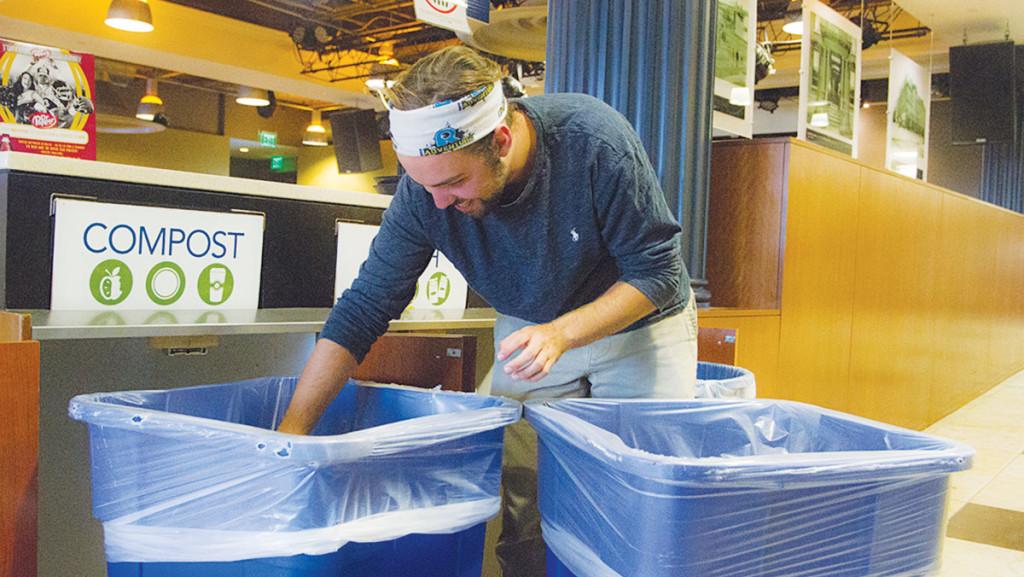With the goal of making sustainability a more prominent part of life at Ithaca College, the Resource and Environmental Management Program is looking to have a student representative available in each residence hall to offer sustainable–living education.
Founded in 1991, REMP is a program on campus that educates people about sustainable living and environmental issues. The students who run the program are known as Eco-Reps, and they set up events that accomplish the program’s educational mission. In June 2015, the Eco-Reps’ interior structure was changed from a 24-person, paid position model to an entirely volunteer system, with the exception of two paid positions, senior Ben Tolles, sustainability project assistant of the Eco-Reps, said.
Jacqueline Robilotta, assistant director of residential education, said the program plans to add an Eco-Rep onto the executive board of each community council, or the student-run governing body of the 10 dormitory clusters, nine of which will be represented by an Eco-Rep.
“Any student who is interested in becoming an Eco-Rep will be invited to serve in the role, however, some residence hall clusters are holding elections for this position to promote visibility and awareness and streamline the process,” Robilotta said.
The residential program is set to debut in late September. In total, there will be about 20–25 Eco-Reps serving on community councils around campus, although volunteer Eco-Reps are always encouraged to join, Tolles said.
The new executive board member would facilitate and encourage sustainable living in his or her dormitory cluster, Tolles said. For example, an Eco-Rep may go door-to-door collecting recycling and showing students how to properly separate their trash. The program aims to educate students and give them a go-to person for questions and guidance on sustainable living, Tolles said.
“The big idea behind this is peer-to-peer education rather than faculty professional staff education,” Tolles said. “I think that’s much more effective.”
The Eco-Rep would also be responsible for setting up two events per semester and helping facilitate some of the larger, cross-cluster events, Robilotta said.
Tolles pitched the idea of installing Eco-Reps into residence halls to the Office of Residential Life in January 2015, while a second part of the program, largely an academic initiative, began three weeks ago.
Kathryn Caldwell, assistant professor of psychology, teaches two courses: Healthy Psyches, Healthy Planet in the fall semester and Conservation Psychology in the spring semester. Both classes have a “solutions project” portion to them in which students try to come up with new and creative ideas on how to get people interested in climate issues, Caldwell said.
“The ideas, unfortunately, would go nowhere because once they were thought out, the semester would end,” Caldwell said.
The Eco-Reps would act as the second half of a symbiotic relationship, picking up where the classes leave off in their projects. Students are already coming up with possible ideas, including a craft fair with local vendors to raise money for sustainability resources on campus, a blackout Friday or more recycling and compost bins, Caldwell said.
Tolles spoke to one of Caldwell’s classes Aug. 26, and five people volunteered to be Eco-Reps. Freshman Christopher Barnes is one of them.
“I think the most important thing … any of us in college all around the world can be doing right now is, for the first time, facing and accepting the current state of life on planet Earth,” Barnes said. “The Eco-Rep program gets that, and I think it’s the best way to start working to solve the inefficiencies that exist in our daily lifestyle. It’s time to start thinking big and making change at the community level.”
The academic initiative is very new, Caldwell said, so the outcome is yet to be decided and there are details to be fleshed out.
“We’re trying this. It might not work,” Caldwell said.
Tolles said although he hopes the program will eventually be successful and well–known, this year’s focus will be on establishing the program.
“My hope is that we can start a program that is known on campus for promoting sustainable lifestyle choices — that people will see an Eco-Rep and know what we are trying to do,” Tolles said. “I think once it’s a very established program we can start to see the effects of our work based on the lifestyle choices of residents.”








